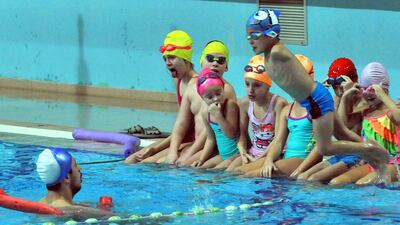Sarajevo // Born without arms, six-year-old Ismail Zulfic happily paddles across an Olympic-sized pool in Sarajevo, an achievement all the more remarkable given the lack of state support for disabled children in Bosnia.
The world marked the UN’s International Day of People with Disabilities, which aims to break down barriers and raise awareness, on Saturday. But in Bosnia, where a bitter civil war has contributed to nearly 10 per cent of the population being disabled, the road ahead is long.
Bosnian children with disabilities get almost five times less state aid than maimed war veterans, while access to schools, sports halls and other institutions remains limited.
Ismail learnt to swim thanks to a coach who is fighting the state’s inaction, and the support of his parents who drive him from their home in the industrial city of Zenica to swimming classes in Sarajevo three times a week.
The 70-kilometre trips to the capital place a considerable financial burden on Ismail’s father, a steel factory worker, and his unemployed mother, but they have enabled him to become a proud member of Spid, the only swimming club in the country for children with disabilities.
Shy and unwilling to talk to strangers, Ismail nevertheless leads a line of eight girls and boys wrapped in towels, some of them limping, along the poolside to start training.
Their coach, Amel Kapo, a sports graduate, set up the swimming school in February after noticing that children with disabilities were coming to the pool without professional supervision.
The 30-year-old was convinced nobody would deny support to such a project, especially not the authorities, but all he could get from them was a one-off grant of 1,000 euros (Dh3,912) from the culture ministry.
Mr Kapo and three fellow volunteers provide training for free, while the monthly bill to use the municipal swimming pool of about €650 is paid through donations from two local businesses.
There are now about 50 children in the club from all over Bosnia. As the children learn to swim, their parents watch from a terrace cafe. “We have become a family,” Mr Kapo said.
Bosnia has about 300,000 people with disabilities out of a population of 3.5 million, including 84,000 who fought in the 1992-1995 civil war. With nearly half of the active population unemployed, social benefits weigh heavily on the budget. And former soldiers are favoured.
According to Zarko Papic at the Bosnia’s Social Inclusion Foundation, wounded veterans receive up to €950 a month and civilian war victims can get €650. Other citizens with disabilities, such as Ismail, get a maximum of €200 to help with medical equipment and other assistance.
“This is systematic discrimination, established by legislation,” Mr Papic said.
Disabled Bosnian children also face marginalisation from an early age, with restricted access to basic education owing to poor facilities and unprepared teachers, according to Unicef.
Ismail’s father Ismet Zulfic said his son was refused by several nurseries in Zenica before they found one that would admit him.
Bosnia ratified the UN convention on rights for people with disabilities in 2010, and human rights ministry official Saliha Djuderija said the government was trying to harmonise its own legislation.
But she admitted that people with disabilities were the “most vulnerable to various forms of exclusion” and that the system of state aid needed reform.
At the Paralympic Games in Rio this year, Bosnia sent only a volleyball team and two shot putters.
But Mr Zulfic is hopeful that one day his son might swim for a Bosnia that takes better care of its citizens.
“The state is what it is, but I am a proud parent,” he said.
* Agence France-Presse

